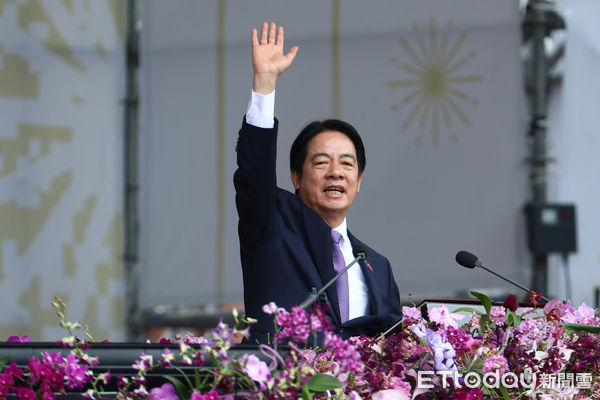Direct translation
Will Taiwan build a "Taiwan Iron Dome"? Lai Ching-te will unveil six key capabilities
Editor : Fang Xun / Source: ETtoday / https://www.aboluowang.com/2025/1010/2289029.html

Today (10) coincides with the Double Tenth National Day. President Lai Ching-te will deliver his National Day speech in his second year in office as usual. It is reported that Lai Ching-te's National Day speech is expected to use the "Six Key Forces of the Power of Progress" as the core element throughout the speech. In addition, in addition to the cross-strait issues that he has touched upon in the past, he is expected to talk about the challenges brought by the US reciprocal tariffs, and on the defense issue, he does not rule out announcing the construction of the "Taiwan Iron Dome" air defense system. In his speech, Lai Ching-te will describe Taiwan's history from authoritarianism to freedom, the "abundant democratic power", the "innovative economic power" that has successfully broken through many international challenges, the "balanced care power" that has shared the fruits of the economy with all people, the "diplomatic partnership power" that combines international alliances to establish a foothold in the world, the "national defense resilience" that strengthens self-defense capabilities, and the "citizen goodness power" of selfless love, fully outlining the most local story of contemporary Taiwan. In his speech, Lai Ching-te will highlight the strategic breadth of national governance, outline a vision for national policy that will impact the country for the next 30 years, and further detail the economic strategy to create millions of jobs, demonstrating strategic confidence in steadily advancing amidst global challenges.
This year's National Day address will begin with a historical perspective, tracing the rich democratic power from authoritarianism to freedom, and charting the course of Asia's democratic beacon, highlighting the unique significance of this year. He will then discuss how Taiwan, facing numerous challenges, can demonstrate its industrial competitiveness and strengths, successfully overcoming these challenges time and again.
In the innovative economic sector, Lai Ching-te will outline future economic strategies and discuss how he will lead Taiwan to seize opportunities amidst the changing landscape and make bold moves to ensure Taiwan's industrial competitiveness maintains its leading position internationally. This will include expanding domestic investment, deepening international economic and trade cooperation, and long-term strategic planning to strengthen Taiwan's industrial strength.
Regarding expanding investment, Lai Ching-te will discuss extending the implementation of three major investment programs in Taiwan and launching a trillion-yuan national development plan. Regarding smart technology development, he will address the "Ten New AI Initiatives," investing in key technology R&D, integrating AI tools into various industries, and promoting the biotech and pharmaceutical industries. Regarding promoting the financial industry, he will emphasize building Taiwan into an "Asian asset management center" and attracting international investment.
Regarding the uncertainties surrounding the undetermined US tariff policy, Lai will discuss the innovative transformation of hidden champions, traditional industries, and small and medium-sized enterprises, as well as the allocation of resources to help businesses, workers, farmers, and fishermen affected by U.S. reciprocal tariffs overcome difficulties.
Regarding domestic affairs, Lai will highlight the benefits of the economy and demonstrate how the government budget will be used to expand support, demonstrating a "balanced support capability" that ensures the benefits of the economy are shared by all. In addition to the continued promotion of the Healthy Taiwan Deepening Plan, the Youth 10 Billion Overseas Dream Fund, the "National Raising 0-6 Years Old 2.0" program, and "Long-Term Care 3.0," subsidies for the child-rearing generation will be provided, such as increased childcare subsidies and childcare subsidies. Starting next year, childbirth subsidies will be increased to NT$100,000 per birth. Regarding care for seniors, in addition to the Long-Term Care 3.0 program launching next year, the "Healthy Taiwan Deepening Plan" has already been launched, which will comprehensively upgrade the medical environment and system and provide the public with higher-quality health care services.
Finally, Lai Ching-te will discuss national defense resilience, from strength to resilience. First, he will discuss the defense budget. Lai Ching-te will likely mention that Taiwan's defense budget has continued to increase over the past few years, including during former President Tsai Ing-wen's administration, when it rose from 1.9% of GDP to 2.5%. Taiwan's defense budget could reach 3.32% next year and 5% by 2030, five years ahead of the NATO standard.
Lai will also discuss the "Whole-Society Defense Resilience Committee" he established at the Presidential Office, which brings together Taiwanese industries, public and private sectors, for whole-society defense training. He also discussed the high-level national security meeting he chaired, which identified the Chinese Communist regime as a hostile foreign force against Taiwan and proposed 17 response strategies to address China's five major national security threats. These, along with over 100 national security legislation, will be submitted to the Legislative Yuan for deliberation during this session.
Notably, Lai also plans to announce in his speech the creation of a Taiwanese air defense system, similar to Israel's Iron Dome. This concept is understood to have two levels: First, within overall defense, "full-layer air defense" will help counter increasingly complex threats in the future, such as drones, rockets, missiles, and military aircraft.
Second, it will help strengthen overall societal defense resilience. For example, as seen in Tel Aviv, with a high-interception air defense network, society can function more resiliently and normally.



No comments:
Post a Comment